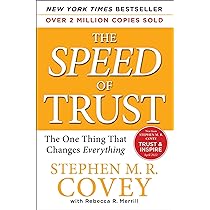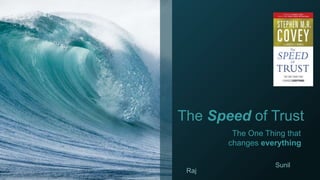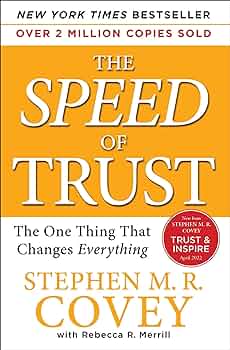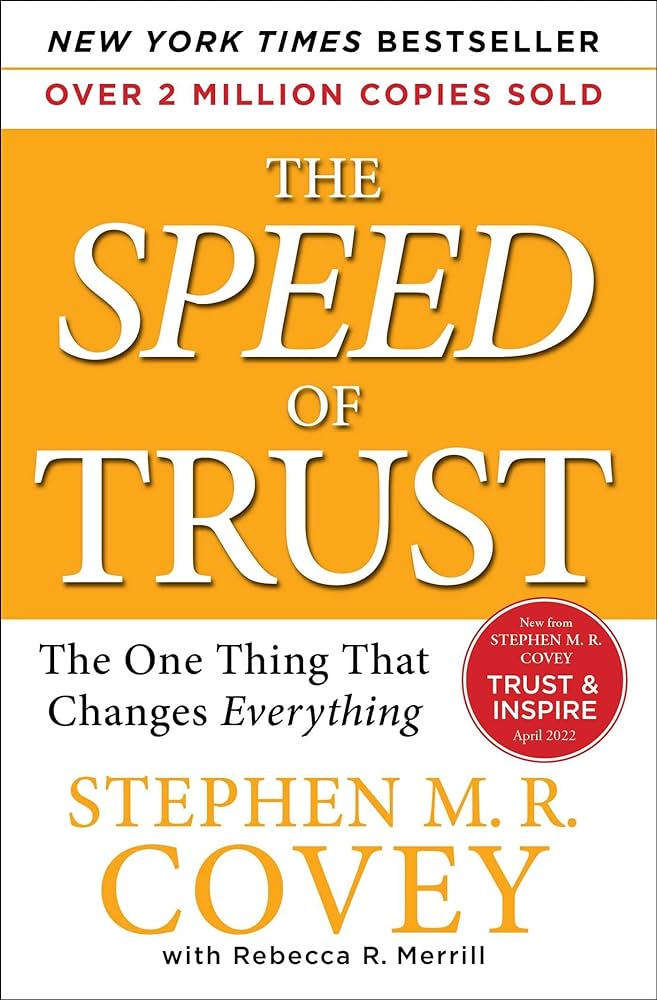Stephen M.R. Covey’s “The Speed of Trust” explores how trust influences success and efficiency in organizations and personal relationships.
Trust accelerates business operations and enhances performance. Trust is a critical component in any successful relationship, whether personal or professional. Stephen M. R. Covey’s “The Speed of Trust” delves into the importance of trust and its impact on efficiency and effectiveness.
Covey argues that trust is a tangible asset that can be measured and improved. Building trust can significantly reduce costs and save time, leading to better outcomes. The book offers actionable strategies to cultivate trust within teams and organizations. By fostering a culture of trust, leaders can drive higher performance and achieve more sustainable results. Understanding and implementing these principles can transform both individual careers and entire organizations.
Introduction To ‘the Speed Of Trust’
Stephen M.R. Covey explains the importance of trust. Trust is a crucial element in relationships. It can speed up processes and reduce costs. Covey describes trust as a skill that can be learned. He breaks trust into components like integrity and intent. Each part can be improved with effort. The book provides practical tips to build and maintain trust. Trust impacts both personal and professional life.
Trust is the foundation of strong relationships. In personal life, trust brings people closer. It makes communication easier and more open. In professional settings, trust leads to better teamwork. Projects move faster and with fewer errors. Trust reduces the need for extensive checks and balances. It saves time and money. Building trust is a worthwhile investment. It pays off in many ways.

The Trust Concept
Trust is the firm belief in the reliability, truth, or ability of someone or something. It has two main dimensions: character and competence. Character includes integrity, motives, and intent. Competence includes capabilities, skills, and results. Both dimensions are crucial for building and maintaining trust.
Trust impacts the speed and cost of every transaction. High trust decreases costs and increases speed. Low trust increases costs and decreases speed. Businesses can save money and time by fostering trust. Trust is a valuable asset in any organization.
The Five Waves Of Trust
Self Trust means believing in yourself. It is about keeping promises you make to yourself. This builds confidence and credibility. People who trust themselves make better decisions. They also inspire trust in others. Being honest with yourself is key. Always do what you say you will do. This helps to build a strong character.
Relationship Trust focuses on how you act with others. Trust grows from your behavior. Always be kind and respectful. Keep your word and be honest. Good relationships are built on integrity and consistency. People notice how you treat them. Trust is earned through everyday actions. Show care and be dependable.
Establishing Self Trust
Trust begins with self-trust. Stephen Covey explains the four cores of credibility. The first core is integrity. Integrity means being honest and keeping promises. It builds trust with others.
The second core is intent. Intent is your purpose and motivation. Good intent shows you care about people. It is important to have positive intentions.
Building Relationship Trust
High-trust leaders always talk straight. They say what they mean. They also demonstrate respect. They listen to others and value their opinions. High-trust leaders create transparency. They share information openly. They right wrongs by admitting mistakes. They also show loyalty. They protect the interests of others. High-trust leaders deliver results. They do what they promise. They get better by learning from experiences. They confront reality. They deal with tough situations. High-trust leaders clarify expectations. They make sure everyone knows their roles. They practice accountability. They hold themselves responsible. High-trust leaders extend trust wisely. They trust others but verify. They listen first. They understand before speaking. They also keep commitments. They honor their promises.
Respect is key to trust. Leaders must value each person. Respect means listening and understanding. It means treating everyone fairly. Transparency builds trust too. Leaders should share information. They should be open about decisions. Transparency shows honesty. It makes people feel safe. Both respect and transparency help build strong relationships. They make teams work better together. Leaders who use these tools are trusted more.

Organizational Trust And Performance
Companies must create systems that support trust. Clear roles and responsibilities are crucial. Employees need to know their tasks. This clarity reduces confusion. Trust grows when people understand their jobs. Open communication channels are also vital. Transparent processes build confidence. Teamwork is enhanced through mutual respect. Organizational structures must be flexible. Adaptability shows commitment to improvement. Strong leadership is essential. Leaders must model trust. Their actions set the tone for the organization.
Trust can be measured through surveys. Employee feedback is very important. Regular assessments help track trust levels. Trust scores show areas needing improvement. Anonymous surveys ensure honest responses. Focus groups provide deeper insights. Listening to employees builds trust. Performance reviews also reflect trust. High trust levels boost performance. Metrics like employee retention are indicators. Trust is linked to job satisfaction. Satisfied employees stay longer. High trust leads to better results. Monitoring trust helps maintain it.
Market Trust And Reputation
Building a strong brand is essential. Trust is the foundation of any brand. People prefer to buy from brands they trust. A trustworthy brand attracts loyal customers. Trust can be broken easily. Always keep promises to maintain trust. Good branding and trust go hand-in-hand. Trust boosts customer loyalty.
Referrals are powerful. Word of mouth spreads quickly. People trust recommendations from friends. Happy customers refer others. Trust grows with positive reviews. Referrals save marketing costs. Loyal customers are your best promoters. Encourage satisfied customers to share their experience.

Societal Trust And Contribution
Building trust creates a better world. People feel safe and work together. Trust is like a strong bridge.
Leaders who trust inspire others. They leave a lasting impact. Trust brings communities closer.
Trust spreads like ripples in water. One act of trust can lead to many more. It makes society stronger.
Neighbors help each other more. Schools and businesses thrive. Trust changes lives for the better.
Restoring Trust When Lost
Start with an honest apology. Admit the mistake and take full responsibility. People appreciate when someone owns up to their actions. Next, ask for forgiveness sincerely. Show genuine remorse and a willingness to make things right.
Communicate openly and consistently. Share your plans to avoid repeating the mistake. Transparency helps rebuild trust faster. Keep promises and follow through on commitments. Actions speak louder than words.
Be patient; rebuilding trust takes time. Trust must be earned back slowly. Show empathy and understand the feelings of those hurt. This creates a path to mutual understanding and healing.
Implementing The Principles Of Trust
Building trust starts with being honest. Always tell the truth, even if it’s hard. Keep your promises. People need to know they can count on you. Listen carefully to others. Show that you care about their thoughts and feelings. Be open to feedback. Use it to improve yourself. Admit your mistakes and learn from them. This shows courage and honesty.
Leaders should model trust by being transparent. Share information openly with your team. Encourage collaboration. Teams that work together build trust faster. Recognize and reward trustworthy behavior. This motivates everyone to follow suit. Foster a safe environment. People should feel free to express their ideas and concerns. Set clear expectations and follow through. Consistency builds trust over time.
The Audiobook Experience
The audiobook format offers many benefits. It is easy to listen while doing other tasks. Audiobooks help to save time. They are great for people who love multitasking. You can listen during a commute or while exercising. Audiobooks are also accessible to people with reading difficulties. Listening to a book can be more engaging. It can bring the story to life. The narrator’s voice adds emotion and depth. This makes the book more enjoyable.
Choose a quiet place to listen. Use headphones for better sound quality. Take notes if needed. Pause the audiobook to reflect on key points. Discuss the book with friends. This helps to understand and remember. Listen to the book more than once. Each time, you will learn something new. Enjoy the journey of listening.
Conclusion: Trust As A Foundational Element
Trust is the glue that holds relationships together. Covey shows that trust speeds up everything. It reduces costs and improves efficiency. Trust is a choice, and it can be built. Covey breaks trust into small, understandable parts. These parts help us see how to build trust. He teaches that trust is measurable and practical.
Covey’s teachings remain relevant today. His ideas apply to business and personal life. Trust impacts all areas of life. His principles help improve communication and relationships. Trust is a key element in successful leadership. Covey’s work is timeless and valuable.
Conclusion
Trust is the cornerstone of successful relationships and organizations. Stephen M. R. Covey’s audiobook, “The Speed of Trust,” offers invaluable insights. By fostering trust, you can boost efficiency and collaboration. Embrace the principles from this audiobook to transform your professional and personal life.
Trust truly accelerates progress.



